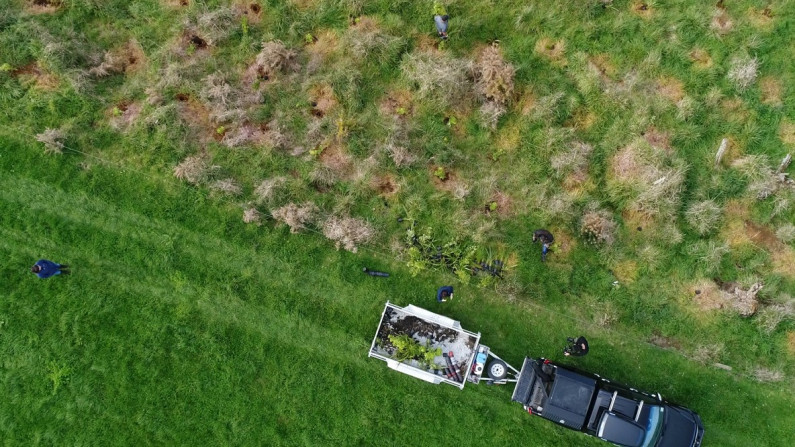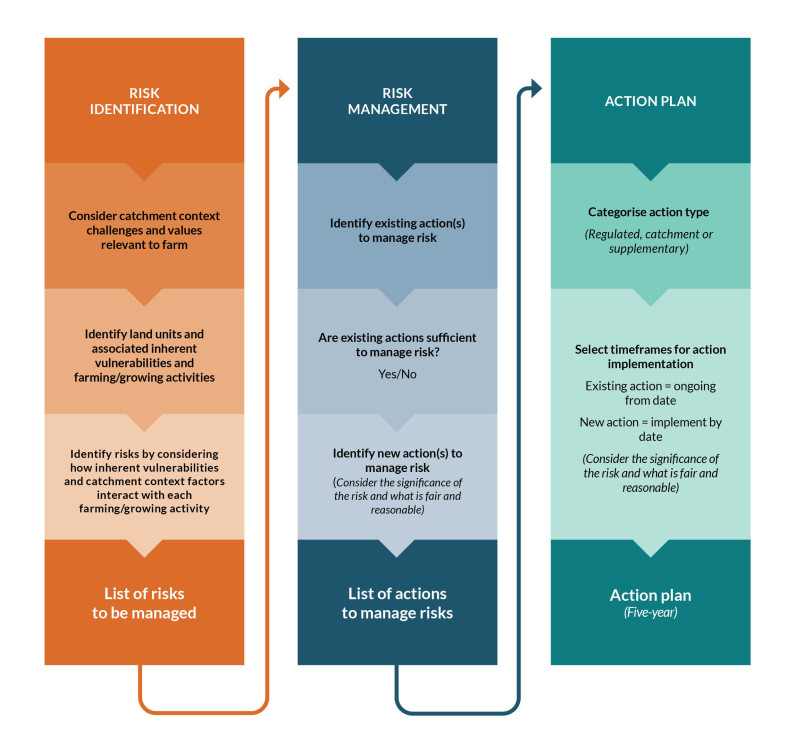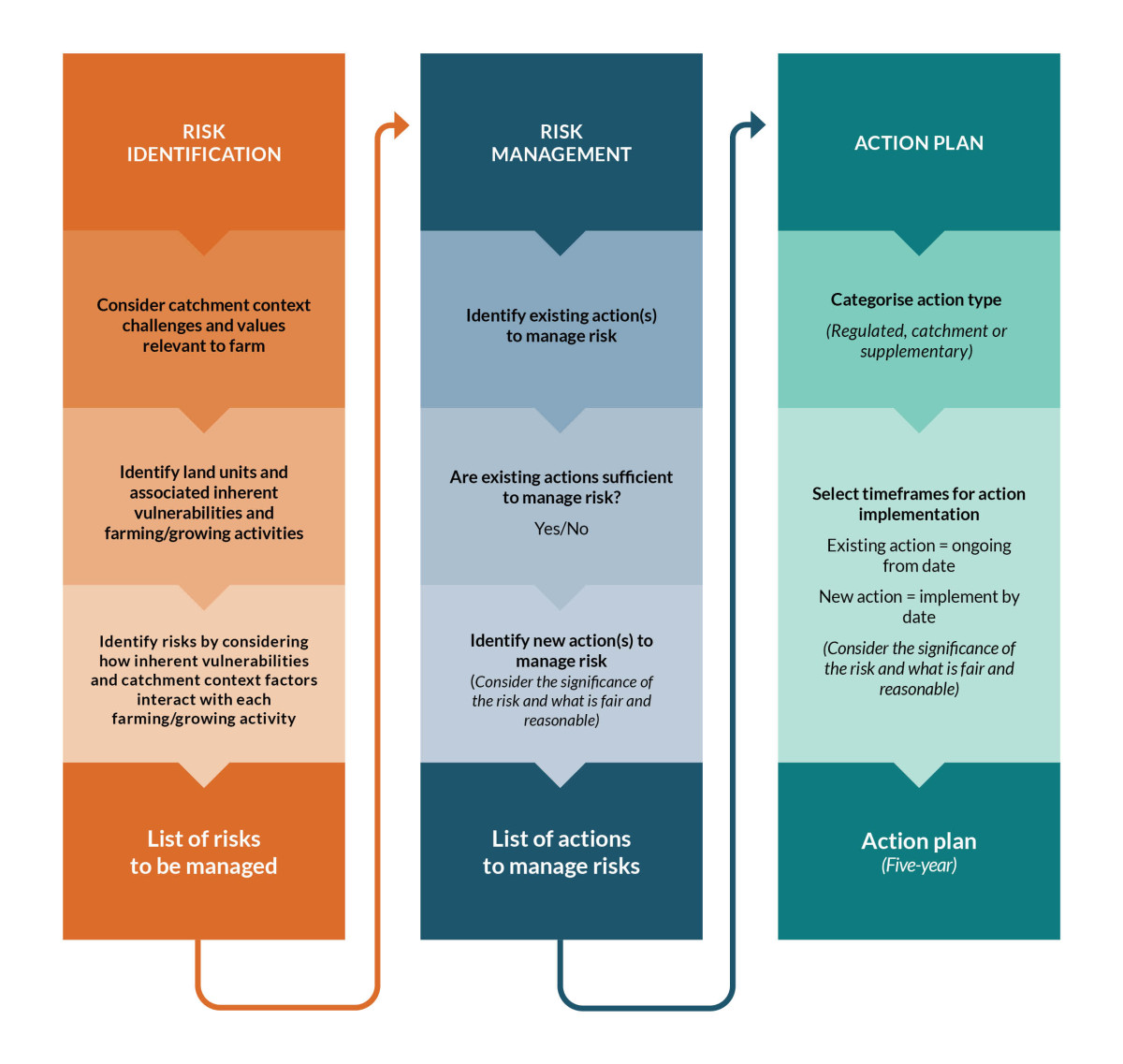Freshwater farm plans
Freshwater farm plans are a practical way for farmers and growers to identify, manage and reduce the impact of farming on the freshwater environment.
Freshwater farm plans are a practical way for farmers and growers to identify, manage and reduce the impact of farming on the freshwater environment.
The Government is working to improve the freshwater farm plan system, and will be exploring ways to make the system more cost-effective and practical for farmers while acknowledging the good work they are already doing.
Some of the improvements have already been announced:
Freshwater farm plans are seen as a key tool for managing risks to freshwater.
The Government is continuing to work with sector groups to develop a pathway for recognising existing farm plans and industry programmes with the freshwater farm plan system. Farmers who have already invested time and effort into developing their farm plans can expect to see that work recognised and built upon under the improved system.
The improvements are being progressed through the Government’s RMA reform process and are expected to be in place by the end of the year.

Freshwater farm plans have been paused in all regions apart from Southland.
This information affects farmers and growers in Southland, who are currently operating under the current regulations, if they have any of the below:
Freshwater farm plans have been legislated under:
Farmers will need to do an on-farm freshwater risk assessment and identify actions to manage (or mitigate) those risks.
On-farm actions to manage risks to freshwater will be tailored to each farm based on:
Freshwater farm plans will need to be certified and audited. The results of certification and auditing will be reported to the regional council.
Many farmers already have a farm environment plan or are part of an industry programme and freshwater farm plans will build on that work.


Farmers can develop their own freshwater farm plan, or they can engage an advisor or a freshwater farm plan certifier to assist them.
Guidance and resources will be available to support farmers and those developing plans including:
This list will be updated as more resources become available.
Farmers and those developing plans can also look to their relevant industry groups and local catchment groups for further support.
When developing a freshwater farm plan farmers and growers will need to consider the catchment context, challenges and values (catchment context) relevant to the farm. This is about understanding the farming or growing operation as a part of the local catchment or sub-catchment.
Your regional council will make catchment context information available. It will help farmers and growers to understand the unique environmental features, current environmental health status, cultural values and practices, and important recreational sites of the catchment.
Catchment context information can be found on the relevant Regional Council website and will continue to be made available as freshwater farm plans are rolled out.
Freshwater farm plans will need to be certified.
Freshwater farm plan certifiers will be appointed by regional councils. Regional councils will make a list of certifiers available. This information is also available on the freshwater farm plan certifier and auditor register.
Farmers must engage a certifier within 18 months of the regulations applying in their area and support them to conduct the certification process.
Once the freshwater farm plan has been certified the certifier will notify the relevant regional council.
Freshwater farm plans will need to be recertified every 5 years.
Freshwater farm plans will need to be audited within 12 months of the initial certification.
Freshwater farm plan auditors will be appointed by regional councils. Regional councils will make a list of auditors available. This information is also available on the freshwater farm plan certifier and auditor register.
Farmers must arrange for an auditor to audit their farm and support them to conduct the audit.
The auditor will assess whether the farmer is implementing the FWFP as set out in the certified plan.
Once the freshwater farm plan has been audited the auditor will notify the relevant regional council of the audit grade.
The timeframe for the following audit will be determined by the audit grade.
Freshwater farm plan certifiers and auditors may come from a range of backgrounds provided they have the necessary skills and experience (competencies) set out in the regulations.
The appointment process for certifier and auditors will involve:
The appointment process is run on behalf of Regional Councils by a third-party appointment process manager (AsureQuality). More information on how to apply to become a FW FP certifier or auditor can be found below:
Once an applicant has completed the appointment process, AsureQuality will make an appointment recommendation to the relevant regional council.
Catchment groups work within their community and with regional councils to identify their catchment priorities.
They can also play a key role in:
The Government wants regulations to be fit for purpose, so they don’t create an unnecessary compliance burden for farmers and growers.
The Government is reviewing the National Policy Statement for Freshwater Management 2020. The Government has already extended the deadline for councils to notify freshwater plans and policy statements by three years until the end of 2027.
Farm environment plans help farmers and growers plan systems and practices that reduce their impact on the environment. Farm environment plans can be used as the basis for freshwater farm plans.
Farmers and growers should continue to use any existing farm environment plans to manage environmental risks until the freshwater farm plan system applies to their farm.
Industry programmes will play a key role in enabling effective implementation and delivery of freshwater farm plans.
The freshwater farm plan system will support existing industry programmes being used to meet freshwater farm plan requirements.
We are actively working with industry:
Freshwater farm plans may become a section within the integrated farm plan framework. Integrated farm planning will provide a single framework for a farmer or grower to bring together all their farm planning requirements into one place. It is not a regulatory tool.
The aim of the integrated approach to farm planning is to:
For more information on freshwater farm plans contact freshwaterfarmplans@mfe.govt.nz
The Ministry for the Environment has been developing guidance to help with the implementation of freshwater farm plans. The guidance will help councils, tangata whenua, farm operators and advisors understand how the freshwater farm plan system works and what they need to do.
See available guidance below. This list will be updated as new guidance becomes available.